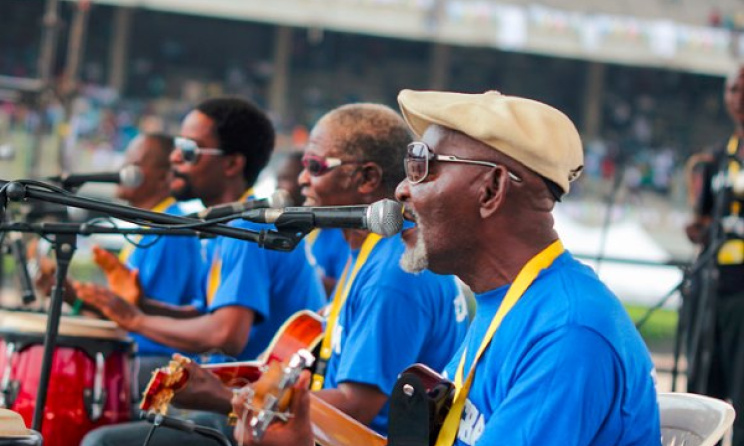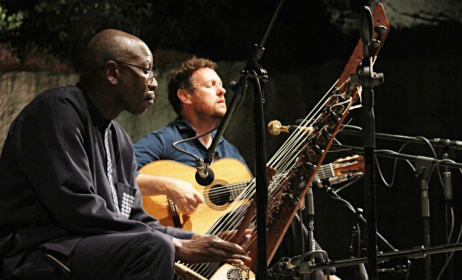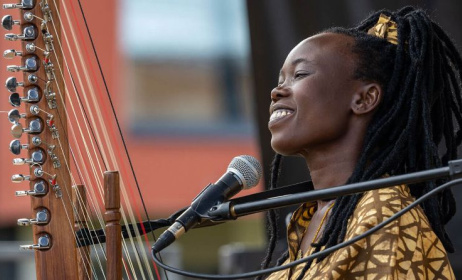Agidigbo: One musical instrument and two songs
A few years ago, I witnessed an agidigbo gig at a buruku joint in my village. It was my first time seeing the instrument and listening to the music.
 Fatai Rolling Dollar (right). Photo: Jide Odukoya
Fatai Rolling Dollar (right). Photo: Jide Odukoya
I was awestruck by the performance of the agidigbo player, who was also the singer. Baba Sedieku deftly played the agidigbo and sang some funny, sarcastic and moral numbers. He enlivened the burukutu joint with his sonorous voice, which blended with the rumbling sound of the agidigbo instrument.
Agidigbo is a traditional Yoruba instrument not known by many. But those into old Yoruba music and thos who have been to a palmwine or burukutu joint would know what the instrument is. The music is what the ancient Yoruba folk used as entertainment and relaxation after a hectic day in the fields.
Basically folkloric in form and delivery, agidigbo usually preaches goodness, love and peace. For the instrument to produce a polyrhythmic sound, it is accompanied by shekere, maracas, tambourine, and drums. The late Fatai Rolling Dollars was an agidigbo maestro but was well known for the guitar.
The name of the subgenre has appeared in two different songs in relatively recent times. Both Lagbaja and Reminisce have a song titled 'Agidigbo'. Lagbaja's 'Agidigbo' is off his third studio album We Before Me. Reminisce's 'Agidigbo' is off his sophomore album Alaga Ibile.
Lagabja’s use leans on the cultural and traditional uses of the instrument. It entertains and preaches morals. Lagbaja opens the song with an agidigbo riff, just like earlier players of the instrument did. “Lowe lowe lami lulu Agidigbo / Ologbon lo mi a gbo / Omoran lo mi a ye / Te ‘ti e sile ko ko gbon o,' (We beat the agidigbo drum in a proverbial manner / Only the wise would hear / Only those who know words would understand / So listen and learn.)
On the second verse, the agidigbo serves as the lead singer while Lagbaja and his backup singers repeat what the agidigbo says. The instrument warns philanderers to desist from promiscuity or else they would court trouble. “Ana ogbe kan opelenge / Oni ogbe kan fati bom bom / Ojo ojo kan nbo / Osi ma gbe jombo.” (Yesterday you took home a svelte lady / Today you’re taking home a thick-bodied one / A day is coming that you’ll court trouble.)
Also, at times, the agidigbo player or singer passes a subtle shot at someone who couldn’t decipher the coded language of the music. In the middle of the second verse, after Lagbaja admonishes the philanderers to desist from their amorous act, he warns the listeners: “Gbo gbo o un ko loriki / So ra e.” (Mind you / Everything is not praise singing.)
Unlike his socially relevant and critically acclaimed ‘Ponmile’, Reminisce's 'Agidigbo', though rich in instruments, is inferior lyrically. The song is in the same category with his recent offering, the shaku-shaku-influenced ‘Problem’.
His ‘Agidigbo’ is only titular and more highlife than juju. The song is an ode to oloshos (sex workers) and is laden with Reminisce's inveterate sexual innuendos and ribald lyrics. Throughout the song, Reminisce emphasises that “prostitution isn’t a crime and larceny is what spoils a child”. The song is fatuous. It’s a mishmash of gibberish. Ise lemi se / Owo lemi pa / E le re yin o.” (You guys are working / And you’re making money / So you can’t be tired.)
Where Lagbaja warns philanderers to desist from womanising, Reminisce does the contrary. He urges a young man who patronises sex workers to carry on because the young man is “working and earning money, so he can’t be tired”.
Both songs show the disparity between old and modern Nigerian pop. Reminisce’s ‘Agidigbo’ validates the sentiments of older Nigerian acts. Modern Nigerian pop glorify sex with music videos bordering soft porn. But the older-generation acts are not prudes. Some of their lyrics also boast of vulgarity. ‘Baby Jowo’ by Sir Victor Olaiya has some sexual innuendos, while Fuji act Abbas Akande Obesere thrived on vulgarism.
In a world where old music is being recycled and old musical instruments are employed by modern artists, agidigbo (music and instrument) might find their way back to mainstream music, just as the Igbo genre ogene, a street sound from the eastern part of the country, found its way into Nigeria pop. When the day comes that a mainstream Yoruba artist includes the agidigbo sound in his or her music, older folks would hope it is Lagbaja's path that is followed.



























Comments